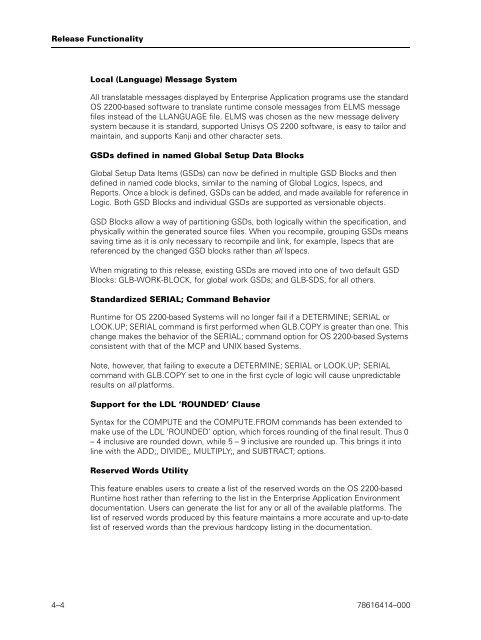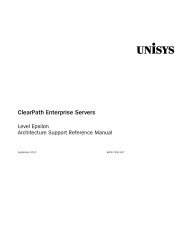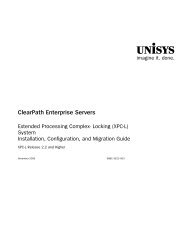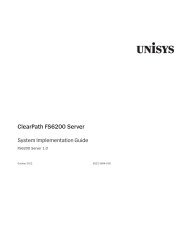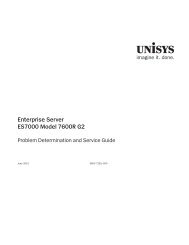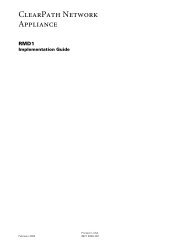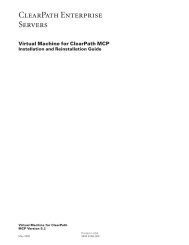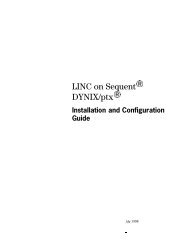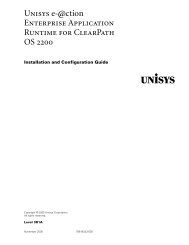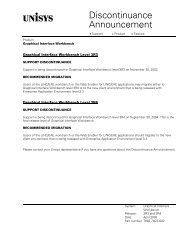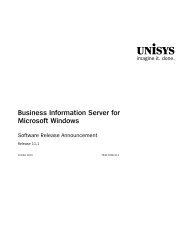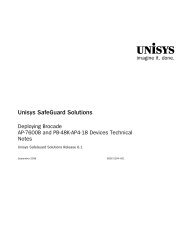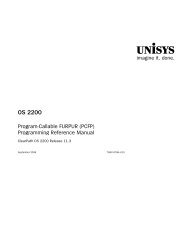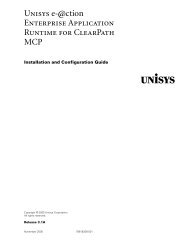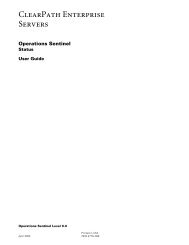Runtime for ClearPath OS 2200 Software Release Announcement
Runtime for ClearPath OS 2200 Software Release Announcement
Runtime for ClearPath OS 2200 Software Release Announcement
Create successful ePaper yourself
Turn your PDF publications into a flip-book with our unique Google optimized e-Paper software.
<strong>Release</strong> Functionality<br />
Local (Language) Message System<br />
All translatable messages displayed by Enterprise Application programs use the standard<br />
<strong>OS</strong> <strong>2200</strong>-based software to translate runtime console messages from ELMS message<br />
files instead of the LLANGUAGE file. ELMS was chosen as the new message delivery<br />
system because it is standard, supported Unisys <strong>OS</strong> <strong>2200</strong> software, is easy to tailor and<br />
maintain, and supports Kanji and other character sets.<br />
GSDs defined in named Global Setup Data Blocks<br />
Global Setup Data Items (GSDs) can now be defined in multiple GSD Blocks and then<br />
defined in named code blocks, similar to the naming of Global Logics, Ispecs, and<br />
Reports. Once a block is defined, GSDs can be added, and made available <strong>for</strong> reference in<br />
Logic. Both GSD Blocks and individual GSDs are supported as versionable objects.<br />
GSD Blocks allow a way of partitioning GSDs, both logically within the specification, and<br />
physically within the generated source files. When you recompile, grouping GSDs means<br />
saving time as it is only necessary to recompile and link, <strong>for</strong> example, Ispecs that are<br />
referenced by the changed GSD blocks rather than all Ispecs.<br />
When migrating to this release, existing GSDs are moved into one of two default GSD<br />
Blocks: GLB-WORK-BLOCK, <strong>for</strong> global work GSDs; and GLB-SDS, <strong>for</strong> all others.<br />
Standardized SERIAL; Command Behavior<br />
<strong>Runtime</strong> <strong>for</strong> <strong>OS</strong> <strong>2200</strong>-based Systems will no longer fail if a DETERMINE; SERIAL or<br />
LOOK.UP; SERIAL command is first per<strong>for</strong>med when GLB.COPY is greater than one. This<br />
change makes the behavior of the SERIAL; command option <strong>for</strong> <strong>OS</strong> <strong>2200</strong>-based Systems<br />
consistent with that of the MCP and UNIX based Systems.<br />
Note, however, that failing to execute a DETERMINE; SERIAL or LOOK.UP; SERIAL<br />
command with GLB.COPY set to one in the first cycle of logic will cause unpredictable<br />
results on all plat<strong>for</strong>ms.<br />
Support <strong>for</strong> the LDL ‘ROUNDED’ Clause<br />
Syntax <strong>for</strong> the COMPUTE and the COMPUTE.FROM commands has been extended to<br />
make use of the LDL ‘ROUNDED’ option, which <strong>for</strong>ces rounding of the final result. Thus 0<br />
– 4 inclusive are rounded down, while 5 – 9 inclusive are rounded up. This brings it into<br />
line with the ADD;, DIVIDE;, MULTIPLY;, and SUBTRACT; options.<br />
Reserved Words Utility<br />
This feature enables users to create a list of the reserved words on the <strong>OS</strong> <strong>2200</strong>-based<br />
<strong>Runtime</strong> host rather than referring to the list in the Enterprise Application Environment<br />
documentation. Users can generate the list <strong>for</strong> any or all of the available plat<strong>for</strong>ms. The<br />
list of reserved words produced by this feature maintains a more accurate and up-to-date<br />
list of reserved words than the previous hardcopy listing in the documentation.<br />
4–4 78616414–000


